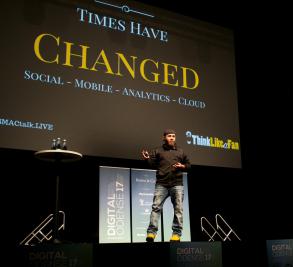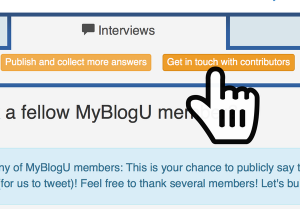Today’s enterprise companies are jumping all in with digital transformation. They are excited about integrating internet of things sensors with big data solutions combined with artificial intelligence leveraging augmented and virtual realities. These technologies and change are very inspiring for the future of work, but these are also the same enterprise companies that have struggled to migrate to the cloud, integrate collaborative social business solutions or embrace a future of work that isn’t just having a BYOD policy.
Enterprise Change Requires Leadership Mindset Shift
One of the most impactful lessons that we can learn from the disruptive move f rom on-premise technology as a product to cloud-based technology as a service is enterprise adoption doesn’t happen quickly while requiring leadership and culture mindset shift. Traditionally the CIO made the company technology decisions deploying hardware and software top down to all other departments within the enterprise. Thanks to shadow IT, that slow silo driven process was disrupted as managers or employees didn’t want to wait and didn’t need too as they could swipe a credit card and download the software they required in minutes. The mass majority of CIO’s looked at this as a control problem attempting to prevent this change by locking down machines often using security as the crutch to prevent their loss of power.
rom on-premise technology as a product to cloud-based technology as a service is enterprise adoption doesn’t happen quickly while requiring leadership and culture mindset shift. Traditionally the CIO made the company technology decisions deploying hardware and software top down to all other departments within the enterprise. Thanks to shadow IT, that slow silo driven process was disrupted as managers or employees didn’t want to wait and didn’t need too as they could swipe a credit card and download the software they required in minutes. The mass majority of CIO’s looked at this as a control problem attempting to prevent this change by locking down machines often using security as the crutch to prevent their loss of power.
The innovative CIO’s and leadership excited about leveraging the benefits now available to the enterprise looked at “shadow IT” not as a control problem rather a process, procedure and communication breakdown. Identifying the change needed is the first step but being able to act on that change and transform the entire organization’s mindset requires collaboration and open communication from the executive leadership down to the new hire entry level employee.
Too Much Distance Between Technology Decision Makers and Users
Over the last 14 years since graduating college, the one thing that’s been clear to me has been that the disconnect between those using and implementing technology within an organization and those making the purchasing decisions has only become further and further apart.
While working for the Defense Information Security Agency, this wasn’t the case which should come as a surprise as we were in charge of deploying, training and implementing cyber security and social collaboration tools for the US government. Not only was this a massive undertaking but attempting to get the Navy to share policies with the Army might go down as the hardest collaborative project possible. Although the project was a disruptive one with it’s on wins and losses the one aspect that we got right was having the right people involved in the technology decision-making process. Not only were managers and end users involved in selecting the solution they were also empowered as leaders and change agents within each of their departments driving adoption, educating coworkers on why the solution was selected and inspiring change through using the solution themselves. Simply it was a difference between having an executive forcing employees to change and having that change educated and inspired by coworkers.
Now as exciting as the rapid adoption rates and increased employee morale was, this empowered change agent that helped select the right technology was now looked by their manager as having too much influence. This manager has always operated with the mindset that job title dictated who the leader was and they’re incentivized by KPI’s that didn’t allow for this change and were never conveyed beyond the manager. This disconnect caused massive issues between the change agent and management forcing the departments to select sides. Sadly I got to witness this myself first as a change agent than a year later as a manager, and this isn’t the change agent or managers fault. The fault lies in leadership and the mindset of the company culture.
“Only 6% said digital goes beyond technology alone to reflect a mindset that embraces constant innovation, flat decision-making and the integration of technology into all business applications.” Via eMarketer report from March 15, 2017
Change Agents Must Be Empowered To Be More Than One Hit Wonders!
The idea of empowering employees to motivate, educate and inspire change amongst a team is essential in today’s rapidly changing business environments. The success of change agents are often linked to the trust they have within their team, their passion for the project because of their involvement in selecting the solution and their focus on the greater purposeless worried about fear or irrelevant KPI’s. Often after a change agents success on a project, they are promoted to a management role on another team being sold on the idea that “we want you to drive the same change you did on your team with the new team you manage.” But what they’re saying is that you the change agent will now work on existing projects where the technology decisions have already been made, you’ll have to answer to the current KPI’s, and you’ll be forced in as the leader of this new team because of your title. In other words, eliminating the three fundamental aspects that made the change agent successful. I refer to this change agent promotion as “kryptonite ejection” because the change agent either accepts they lost their superpowers or they eject and leave for a new company. I discuss change in more detail on episode 29 of my podcast you can listen here.
Empowering change agents within organizations is not a new concept. However, to keep up with today’s digital transformation and change the future of work we must shift this mindset to empower change agents in management roles and also create a culture that allows for leadership and change agents to be identified based on project goals and success metrics – not job titles.
Enterprises that will succeed with digital transformation will be those that shift how and who selects the right technology while creating a culture that empowers change agents at all levels of the organization.
*This is an excerpt from my upcoming book “Millennial Mindset: It’s not the year someone was born rather their ability to embrace Change, Collaboration, Technology, and Community.”
Digital & Social Articles on Business 2 Community(58)







